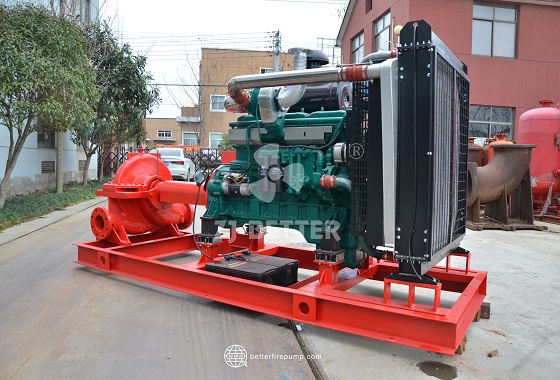Fire pumps, as key equipment in firefighting systems, are directly related to the efficiency and success rate of fire suppression. Diesel-powered fire pump systems, due to their excellent power and stability, are widely used in numerous applications, particularly in situations where power supply is unstable or insufficient. This article will deeply analyze the advantages of diesel engine fire pumps and their critical role in fire emergency response, showcasing their performance and reliability in a variety of complex environments.
1. Powerful Power Output
One of the core advantages of diesel engine fire pump systems is their powerful power output. Compared to electric fire pumps, diesel-powered systems offer higher power output, making them particularly suitable for firefighting scenarios requiring high-flow pumping capacity. Diesel engines, powered by their internal combustion engines, are independent of the external power grid, ensuring that fire pumps continue to operate even in the event of power outages or failures, fully guaranteeing the reliability of firefighting equipment.
2. Excellent Self-Sufficiency
A notable feature of diesel engine fire pumps is their exceptional self-sufficiency. Diesel engines require no external power input, making them particularly suitable for areas where power is scarce or unstable. Whether in high-rise urban buildings or remote rural facilities, diesel engine fire pumps play a vital role in critical moments, providing uninterrupted fire protection.
3. Efficient Firefighting Capabilities
Due to their powerful power and efficient water delivery capabilities, diesel fire pumps can quickly deliver large quantities of water to extinguish fires in the early stages. Their high flow rate and high pressure give them an advantage over other fire pump types when extinguishing large fires. Whether tackling high-rise fires or industrial fires, diesel-powered fire pump systems are more than capable of meeting demanding firefighting requirements.
4. Adaptability to Harsh Environments
Diesel engine fire pumps demonstrate exceptional adaptability in challenging environments, such as high and low temperatures, inclement weather, and complex geographical conditions. Diesel engine systems can operate stably in extreme climates, unaffected by external interference. Furthermore, diesel-powered systems offer a simple structure and easy maintenance, ensuring they remain in good working condition over the long term.
5. Energy Conservation and Efficiency
Diesel-powered fire pumps not only provide powerful power but also offer excellent energy efficiency. Diesel engines are more efficient and fuel-efficient than traditional electric systems for the same power output. Especially for emergency fire response operations requiring extended operation, diesel pump systems can provide longer-lasting support than electric systems.
6. Simple Structure and Convenient Maintenance
Diesel fire pumps have a relatively simple structure, a low failure rate, and their ease of maintenance ensures reliable performance over long periods of use. Diesel engine maintenance is more convenient than other power systems. Users only need to perform basic maintenance such as regular oil changes and combustion system cleaning according to the manufacturer's maintenance manual to ensure the equipment remains in optimal working condition.
7. Flexible Installation and Mobility
Diesel-powered fire pumps offer a variety of installation options. They can be installed in mobile, fixed, or modular designs to meet specific needs, adapting to different locations. Mobile diesel fire pumps are particularly suitable for emergency firefighting operations, allowing them to be flexibly deployed at the scene and quickly put into operation to maximize their effectiveness.
8. Safety and High Reliability
The safety of a fire pump system is paramount. Diesel engine fire pumps feature multiple safety protection systems that automatically detect the pump's operating condition and self-adjust to prevent overloads, overheating, and other issues. Furthermore, diesel engine systems are designed with fire, vibration, and corrosion resistance in mind, ensuring efficient and stable operation even in high-risk environments.
9. Wide Range of Applications
Diesel engine fire pumps are not limited to building firefighting systems. They are widely used in firefighting in high-risk industries such as the petrochemical industry, coal mining, power generation, and steel, as well as in public facilities. Whether extinguishing industrial fires, oil and gas fires, or general building fires, diesel-powered fire pumps provide effective firefighting support for a wide range of facilities.
10. Long-Term Cost-Effectiveness and Environmental Advantages
While the initial investment in a diesel fire pump system may be higher than other pump systems, diesel-powered pump systems offer lower maintenance costs and higher efficiency over the long term, reducing energy consumption while ensuring effective firefighting. Furthermore, modern diesel engines utilize advanced combustion technology, reducing exhaust emissions and meeting environmental standards, helping to minimize negative environmental impacts.
Diesel engine fire pump systems, with their powerful power output, exceptional self-sufficiency, and efficient firefighting capabilities, have become an indispensable component of modern firefighting systems. Whether in complex industrial environments or remote locations, diesel-powered fire pumps provide reliable firefighting support. With the continuous advancement of technology, future diesel fire pump systems will become even more efficient and environmentally friendly, meeting the needs of firefighting in more complex scenarios.
